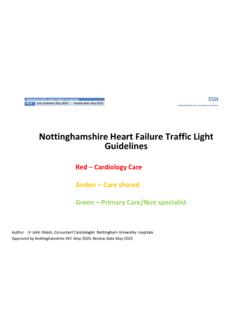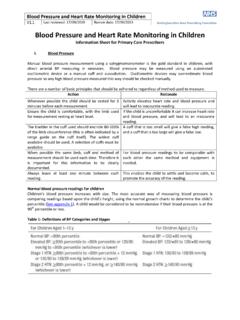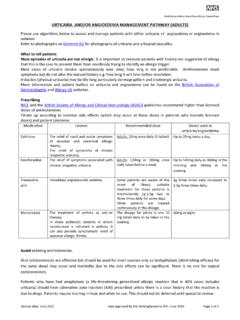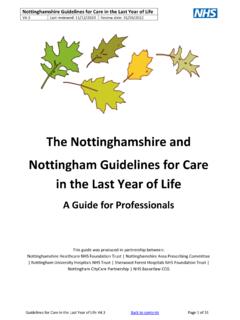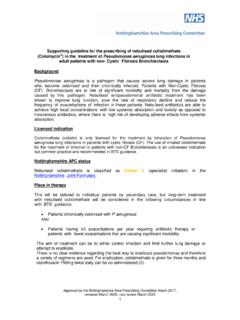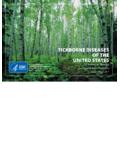Transcription of LOWER RESPIRATORY TRACT INFECTIONS Community …
1 Part of the Antimicrobial Prescribing Guidelines for Primary Care. Updated January 2019. Next review: January 2022. 1 LOWER RESPIRATORY TRACT INFECTIONS Community -acquired pneumonia (CAP) For guidance on managing Community acquired pneumonia during COVID19 outbreak, see NICE (NG165) COVID-19 rapid guideline: managing suspected or confirmed pneumonia in adults in the Community . For choice of antibiotics in penicillin allergy, pregnancy and more severe disease, or if atypical pathogens are likely, see NICE (NG138) Pneumonia ( Community -acquired): antimicrobial prescribing. Bacterial causes: Streptococcus pneumoniae (very common in all age groups).
2 Haemophilus influenzae (uncommon). Atypical bacteria Mycoplasma pneumoniae (particularly in young adults, usually in 4 yearly peaks that last for 12-15 months, rare in >65yr olds. Chlamydophila pneumoniae (probably common). Chlamydophila psittaci (uncommon, history of pet birds). Legionella pneumophila (uncommon, may be a history of recent travel). CAP is defined as the presence of the following symptoms and signs, which cannot otherwise be explained: Acute LOWER RESPIRATORY TRACT symptoms cough and one or more other symptoms. Focal chest signs of recent onset. Systemic symptoms or signs: Pyrexia >38oC.)
3 Sweating. Shivers (rigors). Aches and pains. Treatment Confirmation of diagnosis with a chest X-ray is helpful where available. A 5 day course for low-severity pneumonia treated in the Community should be sufficient, longer courses may be necessary in hospitalised patients or those with more severe pneumonia. If symptoms do not improve as expected after 3 days, consider extending the course for longer than 5 days. Assessment of patients using clinical judgment guided by the CRB-65 score helps to determine the management of CAP for patients in the Community . CRB-65 score for mortality risk = score 1 point for each of the following features present: o Confusion (AMT <8 or new disorientation in person, place or time).
4 O RESPIRATORY rate > 30/min. o Blood pressure (SBP <90mmHg or DBP < 60mmHg). o > 65 years. A CRB-65 score of 0 (low risk) indicates that the patient is likely to be suitable for home treatment. A score of 1-2 (intermediate risk) indicates a need to consider hospital referral and antibiotics may need to include cover for the atypical pathogens . Patients with a score of 3 or 4 (high risk) require urgent hospital admission. Part of the Antimicrobial Prescribing Guidelines for Primary Care. Updated January 2019. Next review: January 2022. 2 Consider immediate antibiotic administration for patients being referred to hospital if CAP is thought to be life threatening or there is likely to be a delay >2 hours to admission.
5 Also seek risk factors for Legionella and Staphylococcus aureus infection. For Legionella these may include: exposure to air conditioning systems, recent travel, cooling towers, spa pools and other artificial water systems. For S. aureus these may include: recent influenza, nursing home residents, aspiration, and chronically ill or debilitated patients. Mycoplasma pneumoniae infection occurs in outbreaks approximately every 4 years. Treatment Medicine Dose Duration of TX CRB-65 score = 0 (usually treat in the Community ): Amoxicillin 500mg TDS 5 days Alternative oral antibiotics if low severity, for penicillin allergy or if amoxicillin unsuitable (for example, atypical pathogens suspected) OR doxycycline OR Clarithromycin Erythromycin (in pregnancy) 200mg first day then 100mg OD for 4 days 500mg BD 500mg QDS 5 days in total 5 days 5 days CRB-65 score = 1-2 (consider hospital referral) Amoxicillin WITH (if atypical pathogens suspected) Clarithromycin OR Erythromycin (in pregnancy)
6 500mg TDS 500mg BD 500mg QDS 5 days 5 days 5 days Alternative oral antibiotics if moderate severity, for penicillin allergy; guided by microbiological results when available doxycycline OR Clarithromycin Erythromycin (in pregnancy) 200mg first day then 100mg OD for 4 days 500mg BD 500mg BD 5 days 5 days 5 days CRB-65 score = 3-4 Patient requires URGENT hospital admission
